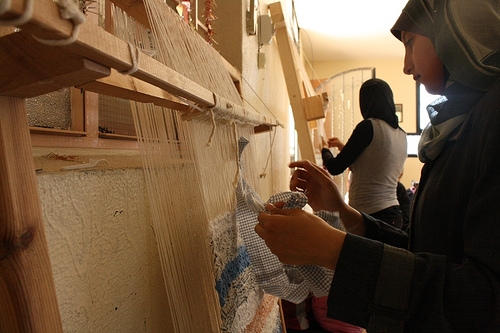
On August 17, 2010 the Lebanese Parliament passed the latest version of a “civil rights” bill for Palestinian refugees. Rather uncivil than civil, the bill maintains the official, state-sanctified racism against Palestinian refugees. While it is no longer illegal for Palestinians to work in menial jobs, the new law continues to ban Palestinian refugees from syndicated white collar professions (like doctor, lawyer, engineer, dentist), and continues to ban them from owning property (a right which was taken away from them in 2001) and from inheriting any property bought before 2001.
This was not the version of the bill that should have passed. Earlier bills, proposed this June, would have granted Palestinian refugees in Lebanon – foreign residents for over 60 years – the right to work in any profession, to own and inherit land, and to access the National Social Security Fund. The version that passed was not the bill advocated for by the Campaign for Civil Rights for Palestinians, by the Right to Work Campaign and the Campaign for Employability of Palestinians. It certainly is not what concerned activists and NGOs have been fighting for since the end of the Lebanese Civil War. In fact, it’s not even similar to the bills that were originally proposed to Parliament.
It is hardly surprising that Lebanese politicians have yet again chosen to reinforce the most racist, discriminatory and basest sentiments in society – fear-mongering and protectionism are invariably more popular than progressive social development theory or basic human rights. What was surprising was that, for a brief moment, Lebanon could have started on the path to becoming a different place: a country where skills and not wasta is rewarded, a society where institutionalized racism is no longer defended, a place people want to stay in, invest in, rather than flee.
Over the past few days I’ve talked with friends and colleagues who live in the camps, second and third generation Palestinian refugees living in Lebanon, and asked them what they thought of the latest “civil rights” bill and how their lives might have changed had they really been granted civil rights. These are their words.
Rasha, 17, Bourj al Shemali1
I never get it, right, I never get why the Lebanese think I would want to stay here. Look, it’s not like I have a choice. Do you really think that 60 years ago my grandparents were like, “Oh, we’re bored of Nablus, what we want to do is leave behind all our money and the house and the family business and go live in this dirty, crowded camp where we can’t work”?!
Look, if I could go someplace else, I would. But I can’t. They don’t give visas to 17 year-old refugee girls. And they don’t let us do anything here. My brother has been trying to find work for like years, he has a computer degree from the university here, and when he applies, they tell him, “We don’t hire Palestinians.”
But I don’t understand why the Lebanese punish us. I mean, ok, the civil war – and I know what happened, I watched all of 7arb Lubnan – but that wasn’t me. I wasn’t even born yet. I’ve done nothing wrong.
But, yeah, when they were like the government is going to let us work like everyone else, I had this idea. See, I’m studying accounting now. It’s fine, but I don’t really like it. What I want to study is Arabic literature, the old classics and poetry. There’s no way that’s going to happen, because I don’t even have the baccalaureate, and then how would I get the money to study? How would I convince my family to pay so I can study something like that? But then, like, if we had the right to work, then I could become an Arabic teacher – not in UNRWA – but at a university. And then I could work, too, and help out. But we don’t have the right to work. So nevermind.
Layla, 38, Bourj al Barajneh
I never believed it would happen. I’ve lived here my whole life, I know how the Lebanese think, and I never believed they would give us rights. They’re scared, it’s a society of fear. They’re scared of each other, so they blame us, they punish us and put the army around the camps and make sure we can’t work decent jobs. And if, somehow, we actually manage to make some money, we can’t invest it back into Lebanon, because we can’t buy property.
So of course I knew the bill wouldn’t pass. Because being Lebanese means being racist, and they’re not ready to change. Look, we all know that it makes more sense to have Palestinians working here than all the other foreign workers. Because we live here, so whatever money we earn, we spend here. The money stays in Lebanon. We already pay the VAT and it’s not like we get any Lebanese health or education services. So this bill, it’s not a logical response, it’s just racist.
But what, what if all that was dropped? What if we could work anywhere, build anywhere, not be presumed guilty and have to worry every time we see the Army? Then I wouldn’t see everything always closed-off. I wouldn’t feel so choked. I would say, “Ok, good, now we can get to work and make something of ourselves here and work hard, so that we’ll be strong when we go back to Palestine.”
Dania, 24, Beddawi
I broke off my engagement last month. I don’t know why, something happened to me and I can’t be happy with him. So it’s bad, it’s really bad right now because it was kitbil kitab and now we have to pay his family a lot of money. My parents tell me it’s ok, that they don’t want me to be this upset, that they support me. But I’m scared and I’m upset and I want to get a job. I don’t want my parents paying the money of the divorce, I want to pay it off.
So, yes, I want a job. I have a civil engineering degree. I have a degree from the Lebanese University in English literature. And I speak English well. Do you think I’m going to find any work? There isn’t anything in the camp that pays well – even the international NGOs are stopping their work here. And Tripoli? Do you really think anyone would hire a Palestinian in Tripoli?
When they said that they were going to change the laws, you know, to give us rights, I thought that maybe things would get better. I know it would take time, but that yes, there would be opportunities. My father could open a store, I could work in an engineering firm, things would be better. But nothing’s changed, and I still need a job.
1 Names and places are all changed
Publisher:
Section:
Category:






